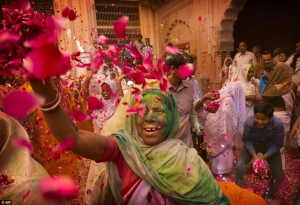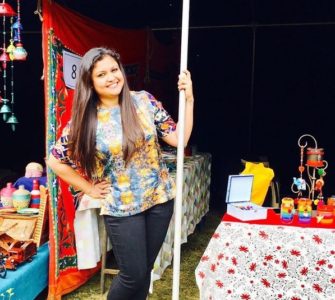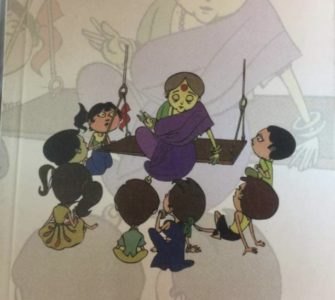 Breaking the centuries-old custom of widows not celebrating festivals, Tukni Devi, a 90-year-old, took part in Holi celebrations for the first time in 66 years. Widowed at the age of 24, Devi was shunned by her family and lived as a recluse in an ashram in the holy Indian city of Varanasi.
Breaking the centuries-old custom of widows not celebrating festivals, Tukni Devi, a 90-year-old, took part in Holi celebrations for the first time in 66 years. Widowed at the age of 24, Devi was shunned by her family and lived as a recluse in an ashram in the holy Indian city of Varanasi.
“Widows in our society are treated worse than animals. I was abandoned by my family to starve and fend for myself. The society thinks we are not worthy of living with them as we lost our husband. I have never celebrated any festival after his death,” she said.
Holi, the festival of colours, is one of the biggest Hindu holidays celebrated across India. However, orthodox traditions forbid widows from taking part in the celebrations, which involves playing with coloured powder. In an effort to draw these widows into mainstream society and lower the social stigma surrounding them, the NGO Sulabh International organised three days of Holi festivities for widows living in the northern Indian cities of Vrindavan and Varanasi. The two holy cities are located in the state of Uttar Pradesh and are often referred to as the cities of widows. Women who are shunned by society after the deaths of their husbands are often abandoned in these cities or go there to voluntarily seek refuge in the different ashrams for widows.
“It was in 2011 that we received a letter from the Supreme Court of India about the pathetic condition of widows living in Vrindavan and Varanasi. They were starving and were not even managing to get one meal in a day. Their condition was worse than stray animals. We started the process of giving them two meals a day and providing financial assistance,” said Vinita Verma, vice president of Sulabh International.
“This kind of celebrations and activities is being done to improve the condition of these widows. We did face resistance from the orthodox members of the society but we will also not give up. Traditionally they are allowed to just wear a white sari [the traditional colour for widows] and cannot wear any makeup. Here they will play with colours, wear colourful clothes and some of them have even decided to apply makeup,” she added.
The celebrations that took place at Pagal Baba Widow Ashram in Vrindavan saw participation by more than 1,000 widows. Over 1,400kg of flower petals and 1,000kg of gulal (coloured powder) were brought in by the NGO for the celebrations.
“Life is tough in the widow ashram. I am the youngest in the ashram and I lost my husband three years ago. We are expected to give up on all the earthly desires and just wait for death. I have been leading a life of hopelessness because there is still a long life ahead of me. However this celebration is giving me hope and I have been never been so happy,” said Annapurna Sharma, 38, a widow from Varanasi.
Another participant in the celebrations was octogenarian Manu Ghosh who has lived in an ashram for widows in Vrindavan after she lost her husband when she was 37.
“The only wish I have is to celebrate this festival with fervour till the time I live on this earth,” she said.
Latest Update
- International artist Krupa Shah and Vijisan Group install ‘Abhiscka the Conch’ sculpture at Haridwar ‘Kumbh Mela Aastha Path’
- Navi Mumbai gets its first dog park
- Keeping up with the changing trends in fashion industry is the key to success: Puja Dawda
- Remembering the valour and sacrifice of the people of Rajasthan
- ‘Lakshyam’ empowers women through ‘Rooh’ initiative
- Home
- Achievers
- News
- STREE
- Indian widows colorfully break a 400-year-old taboo to celebrate the festival of Holi
Indian widows colorfully break a 400-year-old taboo to celebrate the festival of Holi
Apr 19, 2016Stree NewsAchievers, News, STREE0
Reviews
- Total Score 0%
 User rating: 0.00% ( 0
User rating: 0.00% ( 0
Mother Teresa conferred with Founders Award posthumously in UK
Ten variety of sarees that a modern bride must have in her trousseau
Related articles
Advertisement – 1





Advertisements – 3





Archives
- April 2021
- March 2021
- January 2021
- December 2020
- November 2020
- October 2020
- August 2020
- July 2020
- June 2020
- May 2020
- April 2020
- March 2020
- November 2019
- October 2019
- September 2019
- August 2019
- July 2019
- June 2019
- May 2019
- April 2019
- March 2019
- February 2019
- January 2019
- December 2018
- November 2018
- October 2018
- September 2018
- August 2018
- July 2018
- June 2018
- May 2018
- April 2018
- March 2018
- February 2018
- December 2017
- November 2017
- October 2017
- September 2017
- August 2017
- July 2017
- June 2017
- May 2017
- April 2017
- March 2017
- February 2017
- January 2017
- December 2016
- November 2016
- October 2016
- September 2016
- August 2016
- July 2016
- June 2016
- May 2016
- April 2016
- March 2016
- February 2016
- January 2016







